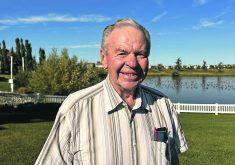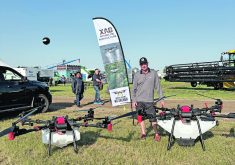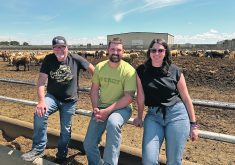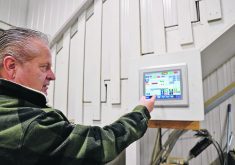Different income streams can improve financial stability, whether it means an investment portfolio or continuing to work
When Reginald and Theresa Nelson started looking into their retirement plans, being financially stable was their biggest concern.
No one wants to retire wondering where their money is going to come from, but retirement doesn’t have to mean that they stop working.
While Reginald was not healthy enough to continue their Rockglen, Sask., seed cleaning and 2,000-acre grain and certified seed operation, he knew he wanted to keep farming.
Following a move to Lafleche, Sask., he was able to get on with a young farmer in need of help during seeding and harvest time. Reginald went into his retirement knowing that he wanted to continue farming in some way, he says, which is benefiting him and his wife in multiple respects.
Read Also

Gene editing digs deeper space in Canadian plant breeding
More Canadian research into crop variety development is incorporating gene editing, and one researcher notes that Canada’s regulatory approach to gene editing will help drive innovation
Not only is it keeping Reginald involved in farming and working at something he still loves to do, but it is also helping finance his retirement goals.
Related stories in this issue:
- Know what you want to get from retirement
- Retirement planning must start now
- Get a handle on expense and income streams
- Call a financial planner before retirement
This all takes planning and sitting down with a professional to talk about investments, benefits, other sources of income, and what your retirement is going to look like from an income perspective.
Having the time to have these discussions and flesh out the short and long-term goals of the farmer is key to a successful retirement, says Paul Bourgeault, executive financial consultant at IG Private Wealth Management in Shellbrook, Sask.
Bourgeault has been working as a financial adviser for 25 years, he says, so he has seen both the financial successes and financial difficulties farmers face with retirement planning, and with that their succession and estate planning as well.
The most important part of financial planning is the discussion portion — what is the history of the farm and where do farmers want to take their operation and their retirement?
Making the farm, and therefore retirement, financially stable will require decisions on possible income streams and how those will impact saving, investing, and retirement.
Additional income can come from many different places.
For farmers, their focus is investing in their operation and Bourgeault says it is sometimes difficult to convince them to invest outside their farm.
“It can be a challenge in that many people are plowing all the money they make back into their operation. Straight from a risk management perspective, you should be investing some money outside of your operation.”
From an investment standpoint, even the leading blue chip companies and well-established and well-known business leaders put 10 percent of their investments outside their own businesses.
The most successful retired farmers that he sees, says Bourgeault, are ones who diversify their income outside the farm. Not only does this allow more financial security, but it also takes some pressure off those who are taking over the operation.
“It gives them so much more flexibility if they’ve got their own pot of resources outside of the farm. It allows them to maybe transition at a lower cost to a family member taking it over, for example.”
Through conversation and discussion with financial planners about these diversified cash flow options, Bourgeault says a lot of farmers came to recognize the importance of having these alternative sources of income in place.
Other income options for retired farmers also include renting out land, but that comes with its own set of challenges.
Bourgeault says he has seen many cases of farmers being too generous with their rental prices, especially if the renters have been farming the land over a long period of time. Land value is on the rise so rental variability is important to discuss with farmers who are renting out their land for retirement income, he says.
“Their net return on their investment after they pay their land tax is, in this case, like two and a half percent. And so then you just have to have a discussion with them about how important is that land to you? Do you really want to keep this land in the family?”
Other income investments can provide a return closer to six or seven percent, so farmers need to look at where they can get those higher rates of return.
From an investment income standpoint, Adam Calibaba, financial security adviser with Calibaba Wealth, also sees the benefits of diversified incomes in retirement as he discusses investment risk with his clients.
Income diversity helps overcome the three main challenges of income insecurity: volatility, liquidity, and shortfalls. Planning for retirement, farmers need to have the cash to live on in the first year but they still need opportunities to take on low-risk investments that can provide them with some security going into the following one-year to five-year period. Making long-term six- to eight-year investments and high-risk investments will show some volatility and year to year fluctuations of return, but can have a greater chance of projected return overall.
Educating farmers on taking those risks is a big part of his job, says Calibaba.
“I try to tell my clients, regardless of their financial situation, whether they’ve been around for a long time or if they’re new farmers, that idea of diversification and getting some money out of the farm is always a good thing. It’s good to not have all your eggs in one basket.”
One of the investments that Calibaba always advises his clients to take advantage of is tax-free savings accounts (TSFAs) and always to the fullest amount allowed, this year being $6,000.
TSFAs are not always going to be the best option from a return standpoint, but other benefits far outweigh the possible variations on the returns, he says.
“It’s not that you’re necessarily going to make more money in that, but to have something that’s outside of the farm that you’re going to have access to along the way for an emergency, or in retirement when the time comes, that’s not tied to the farm can go a long way,” he says.
Whether a farmer is looking for short-term income streams or planning for years down the road, income planning and investments are key to ensuring a successful retirement.















